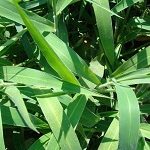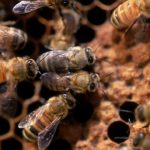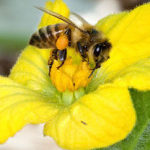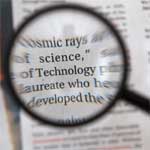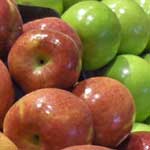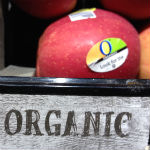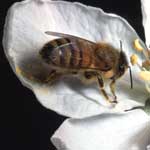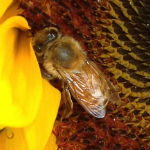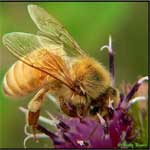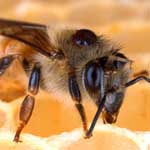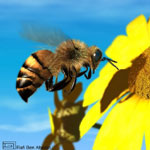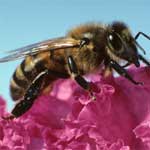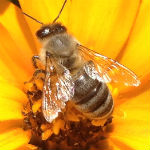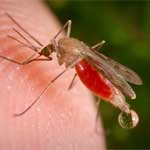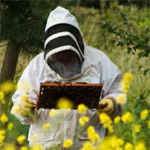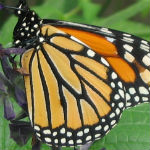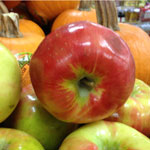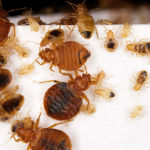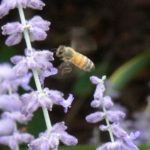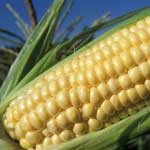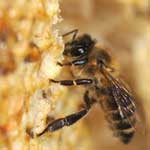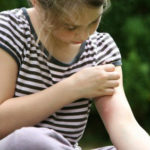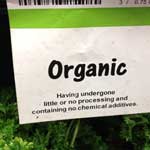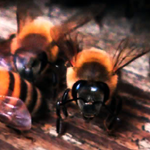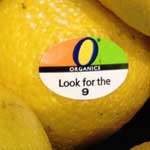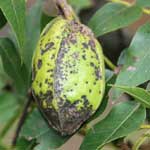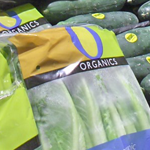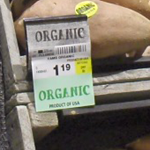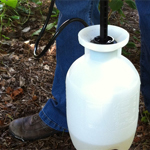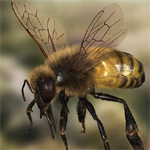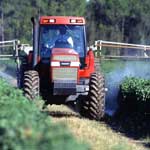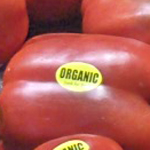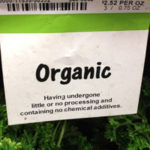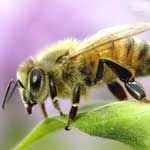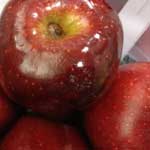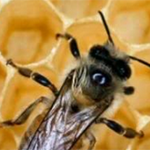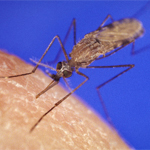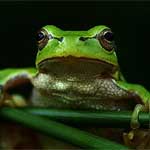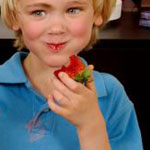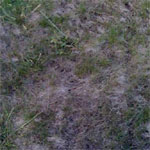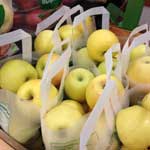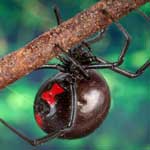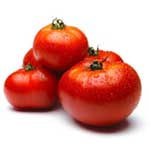"A 'Half Dozen' Questions for EWG," by SafeFruitsandVeggies.com. As they have for the last 20 years, the Environmental Working Group (EWG) released its “dirty dozen” list today which inaccurately disparages many of the most popular fruits and vegetables. To correct and counter the misinformation promoted by EWG, the Alliance for Food and Farming (AFF) provides science-based information to consumers which clearly show the safety of these popular fruits and veggies and the nutritional benefits … [Read more...]
Atrazine in the News
"Atrazine Back in the News, Unfortunately, Thanks to EU’s Precaution," by American Council on Science and Health." EU Parliament, StrasbourgAtrazine, one of the most effective and commonly used herbicides (weed-killers) in the world, is back in the news. Today’s New York Times’ international business article discusses disparities in regulations that complicate Trans-Atlantic trade. Specifically referenced is the gulf that exists between American and European regulations of chemicals and … [Read more...]
Many Factors Behind Colony Collapse Disorder
"What Makes Honeybee Colonies Collapse?" by Joe Ballenger. Honeybee Colony Collapse Disorder has always interested me, because I’m interested in insect pathology – and this is probably the most important insect-pathology related event we’ll see in our lifetimes. I’ve written about CCD here at Biofortified, first in my post Colony Collapse Disorder: an Introduction. I followed this up with Are Neonicotinoids the Cause of Colony Collapse Disorder, where I talked about why the pesticide topic … [Read more...]
Neonicotinoid Ban in Europe Only Helps Pests
"Pests Invade Europe After Neonicotinoids Ban, With no Benefit to Bee Health," by Rebecca Randall. This month, more than 100 natural food brands, including Clif Bar and Stonyfield, joined together in a drive to encourage the Obama Administration to ban pesticides linked to bee deaths. The culprit, they say, is neonicotinoids, which is a class of chemicals commonly called neonics, introduced in the 1990s, that are mostly coated onto seeds to help farmers control insects. ...Yet, as activists … [Read more...]
Weighing the Evidence: Chemical Risks
"Weight Of Evidence: How To Make Sense Of Reports On Toxicology And Pesticides," by News Staff at Science 2.0. There are tens of thousands of human-made chemicals circulating today and some have been bad despite studies that didn't initially find harm, yet almost every chemical is under siege by environmental groups, and they all claim science is on their side. Everything from bisphenol A used in plastics to neonicotinoid pesticides to glyphosate weed-killers are criticized by lawyers at … [Read more...]
Data Show Yet Again: Pesticide Residues Are Negligible
"Agriculture Shows Responsible Pesticide Use," By Dale Hildebrant. You usually don't have to look far to find some group that criticizes the use of pesticides in the agricultural industry. Food safety groups, consumer organizations and even a scattering of ag groups condemn the use of pesticides when it comes to raising crops of any kind. But recently some good news about pesticide use was reported and it came in the form of the annual Pesticide Data Program. This is a collaborative effort … [Read more...]
Consumers Confused About Organic Food Rhetoric
"Study Shows Conflicting Statements on Healthy Eating May Be Impacting Low Income Consumers," By SafeFruitsandVeggies.com. A new peer reviewed study shows that conflicting messaging on food safety and nutrition may be having a negative impact on consumers, especially those with lower incomes. Researchers at the John Hopkins Center for a Livable Future conducted the study which was published in the journal Culture, Agriculture, Food and Environment and titled, “’They Just Say Organic Food Is … [Read more...]
Activist Science and Honeybees
"Activist Science Undermines Research on Honeybees and Pesticides," by Angela Logomasini. As reported in a blog post by David Zaruk, some of the “science” on the impact of neonicotinoid pesticides on honeybees appears to have resulted from a pre-orchestrated campaign, rather than an unbiased scientific process. The researchers involved are members of the International Task Force on Systemic Pesticides, which is part of the International Union for Conservation of Nature (IUCN). The task force … [Read more...]
Top Ten Scares of 2014
"ACSH’s Top 10 Health Scares of 2014," by American Council on Science and Health. 10.The Food Babe attacks ingredient found in Subway bread The chemical azodicarbonamide is used in baking as a dough conditioner, meant to improve the strength and workability of the dough, as well as to increase the speed at which the dough rises. It is a common ingredient in bread. Azodicarbonamide is generally recognized as safe (GRAS) by the U.S. FDA, and is thus considered safe to be added to foods. Read … [Read more...]
Bee Experts Dismantle Touted Harvard Study
"Bee Experts Dismantle Touted 'Harvard' Neonics-Colony Collapse Disorder Study As 'Activist Science,'" by Jon Entine. Chensheng Lu was in his element last month at a speech before a green group at Harvard Law School. The School of Public Health professor was lecturing on his favorite topic--his only subject these days, as it has become his obsession: why he believes bees around the world are in crisis. Lu is convinced, unequivocally, that a popular pesticide hailed by many scientists as a less … [Read more...]
Pseudo-Science, Neonics, and Honeybees
"Still More Politicized Pseudo-Science? The Neonics and Honeybees Saga Takes Interesting, Potentially Fraudulent Turn," by Paul Driessen. Insisting that scientific evidence shows a clear link between neonics and honeybee population declines, EU anti-insecticide campaigners persuaded the European Union to impose a two-year ban on using the chemicals. Farm organizations and the Union’s Environment, Food and Rural Affairs Department unsuccessfully opposed the ban, arguing that evidence for a link … [Read more...]
Honeybee Hype and Scandal
"IUCN’s Anti-Neonic Pesticide Task Force: An Exposé into Activist Science," By The Risk Monger. The Risk-Monger recently came across a strategy document carelessly left on-line by activist scientists that lies at the heart of the founding of the IUCN Taskforce on Systemic Pesticides. The Addendum to this document (see page 3) spells out a rather distasteful anti-neonicotinoid campaign strategy lacking in scientific integrity. The process has been tried and tested before by activists, but their … [Read more...]
U.S. Farmers Need to Challenge Anti-Pesticide Policies
"A Wake-Up Call For U.S. Farmers: The EPA Is Trying To Put You Out of Business, By Henry L. Miller. The Environmental Protection Agency is arguably the worst regulatory agency in the history of the world. But perhaps I understate. EPA has long been highly politicized, disdainful of science, relentlessly incompetent and corrupt. The agency is a miasma populated by the most radical, disaffected and anti-industry discards from other agencies, who collude secretly and sometimes illegally with … [Read more...]
Organic Food Marketing and Homeopathy
"Top Organic Marketing Trustees Resign Because A Member Ridicules Homeopathy," By Hank Campbell. Psychics, homeopaths, magic soap buyers, anti-vaccine and anti-energy people, they all share one thing in common - no, no, not the same political party (good guess, though!), they embrace organic food. And if you don't also embrace their giant swath of superstitious crackpottery, they might depart in a huff. Now that Big Organic is a $105 billion industry, I suspect they would like to quietly but … [Read more...]
Video: Jon Entine Interview on Honeybees
"Jon Entine Debunks Theory Linking Neonic Pesticides to Honeybee Collapse," by American Council on Science and Health. In a masterful example of thorough scientific reporting, Jon Entine makes it clear that the recent accusations that the group of pesticides called neonicotinoids (“neonics”) is responsible for Colony Collapse Disorder (CCD) of honeybees are baseless. Such accusations are bound to be concerning, since honeybees are responsible for pollinating many crops — both here and in … [Read more...]
Flawed Studies on Neonics and Bees
"Part II: Bee Deaths And CCD - Flawed Chensheng Lu Harvard Studies Endanger Bees,"By Jon Entine. Last week, in Part I of this two part series, "Bee Deaths Mystery Solved? Neonicotinoids (Neonics) May Actually Help Bee Health”, we explored the claims by Harvard School of Public Health researcher Chensheng Lu, heralded by anti-pesticide and anti-GMO advocacy groups, for his research that purportedly proves that the class of chemicals known as neonicotinoids are killing bees and endangering … [Read more...]
Neonics Good for Honeybees?
"Part I: Bee Deaths Mystery Solved? Neonicotinoids (Neonics) May Actually Help Bee Health," By Jon Entine. Reports that honey bees are dying in unusually high numbers has concerned many scientists, farmers and beekeepers, and gripped the public. There have been thousands of stories ricocheting across the web, citing one study or another as the definitive explanation for a mystery that most mainstream experts say is complex and not easily reducible to the kind of simplistic narrative that … [Read more...]
No Effect of Neonics in Field Study of Honeybees
"New Field Study Confirms Neonicotinoids Have Little Impact on Honeybees," By Angela Logomasini. As the Ontario provincial government in Canada considers policies that may force farmers to stop using, or drastically reduce use of, a class of pesticides called neonicotinoids, a new study shows why such policies are unlikely to do any good. Supposedly, limiting use of these pesticides will improve honeybee hive health, but such regulations will simply make it harder for farmers to produce an … [Read more...]
How Anti-Pesticide Policies Kill
"Green Hysteria Costs Lives," By Jasson Urbach. Africa Fighting Malaria Apparently we no longer live in a world that values technological advancement. Canadian Environmental Commissioner, Gord Miller, recently stated, "[Neonicotinoids are] the biggest threat to the structure and integrity of the ecosystem that I have encountered in my life... Bigger than DDT". Neonicotinoids are a remarkable and desperately needed kind of insecticide. Miller bases his mistrust of neonicotinoids on an unfounded … [Read more...]
Harmful Effects of Baseless Pesticide Bans
"First DDT, now Neonics—the Harmful Effects of “Environmentalist”-Sponsored, Baseless Pesticide Bans," By American Council on Science and Health.quito In a recent article from Africa Fighting Malaria, author Jasson Urbach addresses the harmful effects of banning a class of insecticides: neonicotinoids. Urbach compares the unfounded fears of neonics with those of DDT, giving a brief history of the negative effects that bans on DDT have had on public health. For example, when South Africa stopped … [Read more...]
Beekeeper Rejects Anti-Pesticide Campaign
"Bees, Bans and Bungling: How an Anti-pesticide Campaign May Spell Serious Trouble," by Claire Brownell. At the end of a long day in the field, Ontario beekeeper Hugh Simpson is on his way to a meeting, where he’s looking forward to a packed agenda talking shop. Bee talk. Honey discourse. And absolutely not about banning pesticides. In March, Mr. Simpson was involved in forming the Independent Commercial Beekeepers. So far, the group has attracted about 20 members, based out of Ontario’s … [Read more...]
Green Politics Won’t Save Monarch Butterflies
"Green Exploitation of the Monarch Butterfly," By Angela Logomasini. Butterflies offer powerful imagery for environmental groups looking to advance their agendas. After all, who doesn’t want to save these beautiful creatures? Surely green activists could leverage those desires to advance voluntary efforts to create butterfly habitat. But the actions of some groups indicates that they would rather exploit the butterflies to gain policy victories in Washington, even if the butterflies suffer as … [Read more...]
Seattle’s Pesticide Ban Won’t Help Honeybees
"Seattle's Action on Honeybees Scientifically Calibrated to Help Politicians, Not Bees," by Todd Meyers. Environmental policy provides numerous examples where trendy politics and ignorance trump sound science. The City of Seattle's latest action to protect honeybees is just the latest example. Taking a step called "very conservative," the City of Seattle announced it will no longer use a class of pesticides called neonicitinoids. The resolution, which is boilerplate language from other cities, … [Read more...]
EWG Calls for “Actual Science” Instead of Rhetoric, But …
“Rhetoric is no Substitute for Actual Science and Hard Evidence," By SafeFruitsandVeggies.com. Ironically, this is a quote from an Environmental Working Group (EWG) blog today. And we couldn’t agree more. Yes EWG, science and evidence should take precedence over baseless rhetoric. So stop using scary rhetoric to mischaracterize risk when it comes to pesticide residues on produce in direct contrast to the “actual science and hard evidence.” So let’s review the science. Read more. … [Read more...]
Josh Bloom Interview: Pesticides and Bedbugs
"Bedbugs of Manhattan Government's Role in the Urban Scourge,"By James Freeman. Why do bedbugs keep showing up in the greatest city in the world? It turns out that human error is as much to blame as the resilience of the six-legged critters. Recent bedbug discoveries in New York City's subway system and in the midtown Manhattan offices of Pacific Investment Management are only the latest chapters in a long, creepy story for Gotham residents. And even if recent incidents don't approach the worst … [Read more...]
Pesticide Bans Doing Harm Rather than Good
"EPA Pesticide Bans Threaten You and the Economy," By By Alan Caruba. When Rachel Carson’s book, “Silent Spring”, was published, filled with totally false claims about DDT, the Environmental Protection Agency looked it over and concluded she had used manipulated data. They concluded that DDT should not be banned, but its first administrator, William Ruckleshaus, overruled the agency and imposed a ban. ... I cite this history from the 1970s because most people believe that the EPA operates on … [Read more...]
Honeybee problems: Complex and Multiple
"No Simple Answer to Bee Issues Exists," By Henry I. Miller, MD. Jennifer Sass's comments about my op-ed "The Buzz About a Bee-pocalypse Is a Honey Trap" are misguided and misleading (Letters, Aug. 6). Although the number of U.S. honey bee colonies has fallen from a World War II peak of about five million to around 2.5 million today, the number of U.S. bee colonies has remained relatively stable and has even slightly increased over the two decades since neonicotinoid pesticides ("neonics") were … [Read more...]
The Buzz About a Bee-pocalypse
"Why the Buzz About a Bee-pocalypse Is a Honey Trap" By Henry I. Miller. On June 20 the White House issued a presidential memorandum creating a Pollinator Health Task Force and ordering the Environmental Protection Agency to "assess the effect of pesticides, including neonicotinoids, on bee and other pollinator health and take action, as appropriate." Why the fuss over bees? Is the U.S. in the midst of a bee-pocalypse? The science says no. Bee populations in the U.S. and Europe remain at … [Read more...]
Pesticides and Public Health
"Pesticides and Health: What You Need to Know," By IFIC Foundation. “Pesticide” can be an ominous sounding word to the average consumer. The suffix “cide,” which comes from Latin cidere meaning “to kill,” has its roots in Shakespearean literature (“Beware the ides of March.”) But in today’s modern world, it has very little to do with Shakespeare. Pesticides have come under scrutiny by some groups and individuals expressing concerns about everything from food safety to nutritional quality to … [Read more...]
California Regulator Details Pesticide Benefits
"Viewpoints: Pesticides are Critical to Providing a Safe, Reliable Food Supply," By Brian R. Leahy. Last year I managed to lose a tooth due to a sliver of a wayward pistachio shell. As a result, I have come to know an excellent oral surgeon in Sacramento who is Harvard-educated and has a wicked sense of humor. On my last visit, he told me that he had just harvested his backyard plums. With a big smile, he said that because he had not used any pesticides on his fruit he did not fall under my … [Read more...]
Questionable Study on Organic Food
"Study Funded by Organic Ideologues Finds Organic Benefits," By Center for Consumer Freedom. A new review funded by the U.K.-based organic farming group Sheepdrove Trust reported in the British Journal of Nutrition that organic crops are healthier than the non-organic variety. It’s a convenient finding for the Trust’s stable-mate, Sheepdrove Organic Farm, which will happily sell Britons any number of organic food products they produce. The group is elated by conclusions of the report it paid … [Read more...]
Just More Bee-S?
"Fewer Bees or Just More Bee-S? By American Council on Science and Health. In today’s New York Times, Mark Winston writes a heart-wrenching column about a problem that will sooner or later come back to sting all of us in a big way—massive die-offs of bees. There are (at least) three problems, though, with his piece: 1. Winston provides no data to support his claim about the “bee colony collapse” that we have been hearing about. 2. This is because there is no such collapse. 3. This does not … [Read more...]
Nutrition of Conventional Crops v. Organic
"Fewer Pesticides and More Antioxidants on Organic Crops: So What?" By American Council on Science and Health. A multi-center, international group of scientists culled the world’s literature and found several hundred studies which they then analyzed (a meta-analysis) to discern significant differences between conventionally-grown crops and organic crops (and foods made from them). They found, on average, a 17 percent higher level of “antioxidants” and a lower rate of detection of various … [Read more...]
Human Efforts Will Save the Honeybees
“'Tampering' with Nature to Save Honeybees," By Angela Logomasini. Environmental groups are calling for an immediate suspension of an entire class of pesticides in order to save ailing honeybee populations—and they won’t wait for results of a recently launched federal effort to study the problem. But the greens' strategy won’t help the honeybees because it targets the least likely cause of recent beehive losses and ignores the more likely ones. Underlying the activists’ ban-now-think-later … [Read more...]
Pesticides and the West Nile Virus
"Killer sand, WMD Insect Spray, and other Idiocy," by American Council on Science and Health. Last year we at ACSH were instrumental in getting the village of Ocean Beach, located on Long Island, to overturn its decades-old chemophobic policy of refusing to participate in the mosquito control program that was routinely used in most of Long Island, as well as wide areas of New York City. We were prompted to do so after ACSH friend Jim Capuono—a six year survivor of colon cancer—nearly died from … [Read more...]
A Plan for Saving the Honeybees?
"Can Obama Save the Honey Bees?," by David Clark Scott. Who could be against saving the honey bees? For politicians, this is what's called an "Apple Pie" issue. And who pollinates the apple trees? On Friday, Obama signed a presidential memo ordering the federal government to come up with a plan for protecting pollinators such as honey bees, butterflies, birds and bats. "The problem is serious and requires immediate attention to ensure the sustainability of our food production systems, avoid … [Read more...]
Ban Threatens Honeybees and Farming
"There is No ‘Bee Armageddon’: Misguided Neonics Ban Threatens Honeybees and Farming," byJon Entine, Stats.org. Science can’t be rushed. Usually legislators make policy decisions on controversial issues only after carefully weighing current research. But just the opposite has unfolded in the EU. European Commissioners last year passed a two-year ban on a class of pesticides known as neonicotinoids in a preemptive move to protect honeybees, after sketchy reports of higher-than-normal winter … [Read more...]
Honeybee Health and Headlines
"Good News and Bad News about Honeybees," By Angela Logomasini. News stories related to honeybee health the past few weeks are all over the map. Some headlines claim that new research proves that honeybees are dying off because of pesticides, while others say honeybees are doing just fine. But reality is different than either scenario. Beekeepers surely have their challenges, but banning pesticide's won't help them or their bees. Much of the media "bad news" comes from a recent Harvard … [Read more...]
Pesticides Used on Organic Food
"The Biggest Myth About Organic Farming," By Ross Pomeroy. The majority of Americans believe that organic foods are healthier than food grown using conventional methods. The majority of Americans are wrong. Two systematic reviews, one from Stanford University and the other by a team of researchers based out of the United Kingdom, turned up no evidence that organic foods are more nutritious or lead to better health-related outcomes for consumers. But the idea that organic foods are healthier … [Read more...]
Regulators More Dangerous than Pesticides
"Killer Regulators Are More Dangerous To Bees Than Neonics Are," By Hank Campbell. At a time when the EPA is rushing to place new regulations on the one thing that is still cheap and increasingly environmentally effective in America, energy, it may seem strange to laud the EPA. But career scientists do solid work there. I made that point in a comment about Rachel Carson and "Silent Spring" recently. While the book was not very solid scientifically it was certainly effective culturally. Every … [Read more...]
Bee Busybodies Rebuked
"Bad News for Bee Busybodies," Washington Times Editorial. The hardy honeybees are back, having returned from dark and mysterious places in the imaginations of the environmentalists. The latest numbers from the Agriculture Department are a stinging rebuke to the doomsayers who spread hysterical tales of a mysterious apocalypse of beedom. In the latest annual survey, federal bee counters reported the lowest rate of over-the-winter bee losses in nearly a decade. Beekeepers call a loss of 19 … [Read more...]
Improving Honeybee Health
"Nationwide Survey Shows Dramatic Improvement in Honeybee Health," by Todd Myers. During the last week, there has been a great deal of attention to a study claiming pesticides are responsible for an increase in honeybee hive death. Known as Colony Collapse Disorder (CCD), beekeepers and scientists have been working to find out what is to blame for the trend. What has been ignored, however, is recent good news about CCD. A recent study by Bee Informed, a nationwide survey of beekeepers, the … [Read more...]
Too Strictly Organic?
"To “Be” or “Not to Be” Organic?" by Dan Janzen. The virtues of many aspects of the Organic Movement such as heightened concern for healthy eating, and increased sensitivity or aversion to exposure to toxins in the environment can be touted as very positive. However, to fully explore the impact of all aspects of the Organic Movement there are some important questions to consider. (1)Is it possible to cross the line in Organic Movement initiatives and “throw out the baby with the bathwater”, … [Read more...]
Toll of Organic Farming
"The Hidden Cost of Organic Farming," By Dan Janzen. I was prompted to begin blogging upon my return from three and a half months of agricultural development work among the Nasa and Guambiano Native Americans in Cauca Department of Colombia. People were giving them books to read promoting 100% organic methods with all kinds of information which, in my opinion, was grossly misrepresenting the facts. Many different organizations including ones from the government were promoting 100% organic … [Read more...]
Unsustainable Organic Farming
"Organic Farming Is Not Sustainable," Henry I. Miller. You may have noticed that the organic section of your local supermarket is growing. Advocates tout organic-food production—in everything from milk and coffee to meat and vegetables—as a "sustainable" way to feed the planet's expanding population. The Worldwatch Institute, a Washington, D.C.-based environmental group, goes so far as to say organic farming "has the potential to contribute to sustainable food security by improving nutrition … [Read more...]
Misleading Organic Marketing
"Organic Marketing: Not Truthful, Often Misleading," By John R. Block. As someone who has dedicated his career to agriculture, I’ve often wondered what drives the now double-digit growth in the $35 billion U.S. organic products industry. Why are so many people willing to pay premiums up to 100 percent or more for items that carry an organic label, and do they really understand what that label means and — even more important — what it doesn’t mean? Many of these questions have now been answered … [Read more...]
“Pesticide-Free” Claim Debunked
"Organic ‘Pesticide-Free,’ and Other Claims Debunked," by American Council on Science and Health. Now that the claim that organic foods are more nutritious than conventionally-produced ones is rarely espoused by responsible writers, organic producers and adherents have fallen back on the “fewer pesticides” claim. But is that really accurate? Blogger Steven Savage says no, not really. In his essay on why organic farming is less than optimal from an environmental point of view, Mr. Savage points … [Read more...]
Organic and “Pesticide Free” Not the Same
"Spending More For Organic Does Not Buy You Pesticide-Free," By Steve Savage. There are several different reasons people are willing to pay more for organic produce, but many consumers do so believing that it is a way avoid pesticide residues. That widely held belief is unfounded. Here is why: There are definitely pesticides used in the growing of organic crops. There are residues of those materials on the harvested products. Residues of synthetic pesticides are also frequently found on … [Read more...]
Endocrine Disrupters in Your Backyard?
"The Newest 'Endocrine-Disruptor' Can Be Found in Your Backyard, Claims a NY Times Op-ed," by American Council on Science and Health. It’s starting to feel a little bit like summer on the East coast now, which means people are clean up their yards and gardens. And that means using “chemicals”, which according to an op-ed by physician Diane Lewismay in the NY Times, can end up in drinking water. Is that true? And if so, are these chemicals (generally pesticides and weed-killing herbicides) … [Read more...]
DDT and Malaria
"DDT Research is “Biased and Erroneous” If You’re Gonna Screw Up, You Might As Well Do It Really Well," by American Council on Science and Health. Screen Shot 2014-05-09 at 1.58.22 PMIf there is a more obvious case of bad science, and its impact on human health, we’d like to see it. Because it turns out that DDT, the evil chemical blamed by Rachel Carson in her 1962 book Silent Spring for thinning of bird eggs, does no such thing. And the consequences of this “error” are tragic—one million … [Read more...]
Feeding the World with the Help of Herbicides
“'Atrazine and The Forever War on Science' Makes for Scary yet Incisive Reading," by American Council on Science and Health. In a brilliantly-written perspective piece on his Science 2.0 blog, Hank Campbell skewers a lot of folks who really need skewering. His scythe and rapier draw blood from his targets, and his insights accrue to the reader: the rampant chemophobia pervasive in America, where “chemicals” are feared when they are recognized at all; the pandering of pseudo-journalists giving a … [Read more...]
Anti-Pesticide Attack on Science
"Atrazine And The Forever War On Science," By Hank Campbell. I'll tell you up front, I am not a big fan of chemicals. It's not that I have chemophobia, or any science-phobia, I instead have that special sort of elitism that is available to people who have just been lucky enough to not need chemicals. I don't even like to take aspirin and I have that luxury because I haven't needed to take any drugs for a recurring condition, so it's really easy for me to embrace such naturalistic posturing. … [Read more...]
Rash Regulation May Harm Honeybee
"Regulate-First-Think-Later Approach to Harm Honeybees," by Angela Logomasini. European bureaucrats placed a two-year ban on a class of pesticides in the name of “protecting honeybees” when in fact, as one EU official recently admitted, they didn’t have evidence that the chemicals present a serious threat to honeybee health. According to an article in Food Chemical News, the European Commission official admitted that the government banned the chemicals simply because it was “the only factor” … [Read more...]
Growers Call for Science-based Approaches to Help Honeybee
"Growers say Pesticide Ban Won’t Solve Bee Problems," Eric Mortenson. The Oregon Association of Nurseries urges Congress to use a collaborative and scientific approach to regulating pesticides that some blame for honeybee deaths. Instead of banning the neonicotinoid class of pesticides, Congress should follow Oregon’s example and use a collaborative and science-based approach to improving honeybee health, the executive director of the Oregon Association of Nurseries said. OAN director Jeff … [Read more...]
Questionable Study on Children and Pesticides
"For the Record: 'Children in agricultural areas are being exposed to a dangerous cocktail of pesticides,'" By Sense About Science. An article in the Guardian, 29th April 2014 reported that “Children in agricultural areas are being exposed to a dangerous cocktail of pesticides”. It referred to a report published by Générations Futures, a French health and environment group. Dr Paul Illing, a recently retired registered toxicologist and regulatory affairs consultant explains this is not what the … [Read more...]
World Malaria Day
"World Malaria Day: April 25, 2014," by American Council on Science and Health. Today marks the 8th annual official recognition, via World Malaria Day, of the horrendous toll taken by the mosquito-born infection. ... Read more. Watch the Video: … [Read more...]
Organic Mommy Mob
"The Beliefs of the ‘Organic Mommy Mafia’ Are on Trial," by American Council on Science and Health. “‘Am I going to be an outcast?’ A friend, who recently moved to an upscale neighborhood in Madison, Wis., called me last week to ask if she would be able to make mommy friends if she continued feeding her children — gasp! — non-organic food.” This is how Naomi Schaefer Riley begins her piece in the New York Post, in which she very accurately describes the emergence of a group of parents called … [Read more...]
Organic Mom Mafia Revisited
"More on the Organic Mom Mafia," by Julie Gunlock. As Charlotte mentioned in her post yesterday, Naomi Schaefer Riley’s excellent piece in the New York Post exposes a new type of helicopter parent—the type that has to hover not only over their own child’s plate of food but over your child’s plate as well. Some of these women are indeed insufferable and judgmental and nervous wrecks and they about as much fun as a trip to the dentist, but there’s another group of women who, while also woefully … [Read more...]
Organic Mom Mafia
"Meet the Organic Mom Mafia," Charlotte Hays. Naomi Schaeffer Riley had an excellent column yesterday on “the tyranny of the organic mom mafia.” “Am I going to be an outcast?” a friend who feeds her kids—gasp—non-organic food asks Schaeffer Riley. Riley quoted IWF’s own Julie Gunlock as a proponent of food sanity: Read more. … [Read more...]
Dirty Truth About Organic Produce
"Let Facts, Not Fear, Guide Healthy Food Choices," By SaferFruitsandVeggies.com. There are decades of nutritional studies that clearly show that consumption of fruits and vegetables improves health and leads to a longer life – these studies were largely conducted using conventionally grown produce. And, there is an impressive body of work by the government plus peer reviewed science that shows that residues, if they are present at all, do not pose a food safety concern. Yet certain activist … [Read more...]
Findings of Honeybee Health Study Encouraging
"Encouraging News about Honeybee Health," By Angela Logomasini. A recently released study in Europe reports some good news about honeybee health, which should prompt public officials to reexamine a recent ban on some agricultural products. “It’s the first major study of pests and diseases that affect honeybees. A lot of it seems very encouraging,” honeybee researcher Tom Breeze, says in a Reuters news story. The study examines honeybee populations in Europe after recent disappearances of entire … [Read more...]
Junk Science on Glyphosate and (Roundup) Health Risks
"Debunking Pseudo Science “Lab Testing” Health Risk Claims about Glyphosate (Roundup)," by Academics Review. On April 7, 2014 a television “documentary” in Australia reported that a study of 10 nursing mother’s milk revealed the presence of glyphosate. This report referenced claims announced made by a “study” commissioned by anti-GMO activist group Moms Across America with “Sustainable Pulse,” an online “news service” published by anti-GMO campaigner and organic food entrepreneur Henry … [Read more...]
Consumers Misinformed About Organic Food
"Why Consumers Pay More for Organic Foods? Fear Sells and Marketers Know it," by Academics Review. An extensive review of more than 200 published academic, industry and government research reports into why consumers adopt organic product purchasing behaviors was conducted by Academics Review – a non-profit led by independent academic experts in agriculture and food sciences. This review was then supplemented with an assessment of more than 1,000 news reports, 500 website and social media … [Read more...]
Pesticides Vital to Food Production in India
"Debunking the Myths on Pesticides is Vital to Raise Food Production in India," By Rajju D Shroff. It is an unsupported claim commonly accepted that all pesticides are unsafe, both for crops and human health. In recent years, studies have highlighted the toxic effects of pesticides, especially in the long run. Most attacks have come from selfacclaimed environmentalists and some environmental NGOs, without enough research to even corroborate their findings. A major concern put forth by such … [Read more...]
Ignore Greens’ Dirty Politics
"Don't Let Annual List Release Put a Damper On Spring," by SafeFruitsandVeggies.com. It’s April now, spring is here which means an even bigger variety of healthy and safe fruit and veggies will be available to consumers at restaurants, grocery stores and farmers’ markets. But before consumers can get too excited, they’ll be greeted this month with the annual release of the “dirty dozen” list which inaccurately calls into question the safety of fruits and vegetables most popular among American … [Read more...]
Organic Food & Cancer Risk
"Organic Food Does Not Reduce Cancer Risk," By Hank Campbell. Organic food has built a lot of mythology around its process - more ethical, more nutritional, fewer pesticides, a larger penis for the sons of organic shoppers - but one claim was a puzzler only subscribed to by the kind of people who buy homeopathy and healing crystals; that eating organic might reduce the risk of cancer. The premise is logical, at least for organic shoppers, if only adjacently valid scientifically. Poor diet has … [Read more...]
Fishy “Link”: Glyphosate and Celiac
"A Fishy Attempt To Link Glyphosate And Celiac Disease," By Steve Savage. Stephanie Seneff (a computer scientist at MIT), and Anthony Samsel (a retired consultant), have recently been attempting to link the use of the herbicide glyphosate to a long list of modern maladies. Their latest such attempt to is Celiac disease. The overall argument for the glyphosate/Celiac link has already been quite thoroughly debunked by a Celiac expert, but there is one other good reason to dismiss the "link" which … [Read more...]
Eating Organic Has No Effect on Cancer Risk
"A New Study Has Found that Eating an Organic Diet Does Not Reduce the Risk of Cancer," by CBS Atlanta. Researchers monitored the health of 600,000 women aged 50 or older for nine years asking whether they ate pesticide-free organic food. Roughly 50,000 of the women developed one of the 16 most common cancers during the study period in total. No difference in overall cancer risk was found between a comparison of 45,000 women who “always” or “usually” chose organic food and 180 women who never … [Read more...]
Beekeeper: Alliance with Greens is Counter-Productive
"Beekeeper Speaks Out Against Anti-Pesticide Campaigns," By Angela Logomasini. Anyone worried about honey bee survival should read the piece by Canadian beekeeper Lee Townsend in the Guelph Mercury newspaper. In recent years, beekeepers have seen some of their hives disappear without much explanation, a phenomenon referred to as”colony collapse disorder.” Green activists have used this situation to randomly initiate bans on various pesticide products in the name of saving the bees, and their … [Read more...]
Pesticide Regulation Means Less Wheat to Feed World Population
"Curbing Pesticides Will Slash Wheat Yields," By AFP. France’s winter wheat harvest could shrink by over a tenth if farmers meet targets to halve pesticide use, said a study Thursday highlighting the challenge of feeding Earth’s growing population. The estimates come from field trials where scientists compared yields to cuts in pesticide use. Extrapolated for the country as a whole, halving pesticide use could mean a decline in winter wheat production of two to three million tonnes per year, … [Read more...]
New Yorker’s Attack on Science
"Turning Science into a Circus: The New Yorker, Rachel Aviv and Tyrone Hayes," By Bruce Chassy, Ph.D. Titled “A Valuable Reputation,” it purports to tell the story of Berkeley researcher Dr. Tyrone Hayes and how, after he supposedly revealed the harmful effects of a popular herbicide on frog development, the chemical’s maker attempted to discredit him. In subsequent statements by the author and other articles, this has morphed into allegations of a full-fledged corporate conspiracy one … [Read more...]
Beekeeper Says: Alliance with Greens is a Mistake
"Canada’s Bees are Thriving: Public Needs Facts, not Fear," By Lee Townsend. News outlets throughout Canada are filled with stories about the imminent decline of honeybees and the calls by some beekeepers to ban the pesticides — called neonicotinoids — which they blame for their problems. As a commercial beekeeper, I have a couple of points to make that may surprise some readers. First, the Canadian honeybee industry is far from collapsing — in fact, it's thriving. The numbers don't lie. Both … [Read more...]
Questionable Claims About Pesticides and Health
"No, Pesticides Did Not Give Your Child A Tiny Penis - Or Autism," By Hank Campbell. In mainstream media, everywhere from Fox News to Time (and here on Science 2.0, though with a little more skepticism) a bizarre study is all the rage - pesticides and other environmental toxins will give your kid a malformed penis and cause autism. And state regulations...prevent it. This overturns all of epidemiology, right? Now something has to be done. Autism causes might be okay to debate in a reasoned … [Read more...]
Anti-Public Health: Green Agendas
"Essay Attacks “Environmentalists” for Anti-Public-Health Agendas," By American Council on Science and Health. Richard Tren has long been well-known as a fervent proponent of the more widespread use of public-health insecticides, especially DDT, to prevent the scourge of malaria in Africa. He co-founded “Africa Fighting Malaria,” and co-authored several tomes and articles on this subject. His current op-ed in Forbes.com, “Anti-Science Environmentalists Ban ‘Neonic’ Insecticides, Imperiling … [Read more...]
Anti-Science Attacks on Public Health and Pesticides
"Anti-Science Environmentalists Ban 'Neonic' Insecticides, Imperiling Global Health," By Richard Tren. Some of history’s greatest advances in public health – especially in regions plagued by insect borne diseases – have come from the judicious use of pesticides to kill or repel the insect vector before it can infect human populations. Because the market for public health pesticides is relatively small, however, most of these vital chemistries were developed for larger agricultural uses. … [Read more...]
The New Yorker’s Puff Piece on Tyrone Hayes
"Did The New Yorker Botch Puff Piece On Frog Scientist Tyrone Hayes, Turning Rogue into Beleaguered Hero?" by Jon Entine. Who Is Tyrone Hayes and what’s the real story behind the University of California researcher’s sensational claim that he and his family are targeted victims of Big Ag? According to the amphibian scientist and as echoed in a recent 8,000 word mega-feature in the New Yorker by Rachel Aviv, Hayes is an addled but unfairly attacked whistler-blower, victim of a multi-year long … [Read more...]
USDA Data Shows Pesticide Residue Insignificant
"Our Farmers Get An A+ For Low Pesticide Residues," By Steve Savage. Last week, the USDA released its annual Pesticide Data Program (PDP) report about pesticide residues on food. This release comes from extensive sampling of crops entering the market during 2012. Here is the official summary statement from the USDA: "The Pesticide Data Program provides reliable data through rigorous sampling that helps assure consumers that the produce they feed their families is safe." And the official … [Read more...]
School Kids Suffer from Anti-Pesticide Policies
"Consequences of Misguided No-Pesticides-in-Schools Law," By Angela Logomasini. Connecticut lawmakers are considering granting schools an exemption to a dumb state law that bans the use of synthetic pesticides on school properties. WNPRNEWS reports: "For years, towns like Cheshire and Branford have been pesticide-free, treating their municipal fields with only organic products. But some school officials argue if groundskeepers can't use certain EPA-approved synthetic fungicides, herbicides, … [Read more...]
Myth: Chemicals Affect Sperm Counts
"Stupid story of the day— The War On Men: 10 Ways Masculinity is Under Attack," by American Council on Science and Health. Here we go again. Mixing science with politics. We all know how well that works. Yet, Paul Joseph Watson, writing on Infowars.com manages to do just this—with a side order of chemical scares tossed in, and the result is predicable—a big mess. Watson “identifies” ten ways that men are being emasculated. The first two have to do with the “seismic shift” in the balance between … [Read more...]
Organic Food Not Pesticide Free
'Organic' Doesn't Mean Pesticides Weren't Used," By Barbara Quinn. Brian Leahy has an interesting history. In 1980, he operated a 900-acre organic rice farm in California. In the 1990's, he managed an 800-acre organic corn, soybean, alfalfa and cattle farm in Nebraska. In 2002, he became executive director of the California Certified Organic Farmers (CCOF). Then in 2012, Leahy became the director of the California Department of Pesticide Regulations. Does that seem a bit strange? Read more. … [Read more...]
Honeybees and Pesticide Ban Reversal?
"Bee Deaths Reversal: As Evidence Points Away From Neonics As Driver, Pressure Builds To Rethink Ban," by Jon Entine. If the Environmental Protection Agency moves to restrict neonicotinoid pesticides because of fears that they are causing bee deaths, it will happen in spite of the mounting evidence rather than because of it. Last December, the European Commission banned the use of neonicotinoids, often called neonics, for two years. The moratorium, support for which was channeled by the … [Read more...]
Expert Says: Pesticide Residue “Not Really a Concern”
"Pesticides Get Gad Rap, Expert Says," By Carol Ryan Dumas. Pesticides are an essential tool in production agriculture yet often get a bad rap, particularly when it comes to pesticide residues in food, an expert says. In reality, pesticide use is heavily regulated and allowable residue levels are so low that the issue of safety is insignificant. ...The dangers of pesticides are exaggerated by the media and special-interest groups, an expert says, but the truth is they are an essential tool in … [Read more...]
Conventional Produce Healthy for Kids
"Organic Shmorganic: Conventional Fruits and Vegetables are Perfectly Healthy for Kids," By Melinda Wenner Moyer. When my son was a baby, organic was a synonym for edible. If the apples I found at the grocery store weren’t certified, I wasn’t buying them. I knew that conventional produce could harbor traces of pesticides, and I’d read that pesticides could affect brain development. Sure, the details of this association were hazy—I didn’t know how many pesticides my son might ingest from … [Read more...]
Why Pesticides Should be a Favorite Thing
"Why Anti-Pesticide Campaigns do Unintended Harm," by Angela Logomasini. Black spots on roses and flea bites on kittens; blight fallen petals and overwrought Britons. These are just a few unfavorable things associated with “green” attacks on pesticides. While pesticides have risks that must be managed, they also provide important benefits to farmers, gardeners and consumers. These benefits are being lost in a politically correct sea of regulations and blind support for everything “organic.” … [Read more...]
Organic Food Not Better for the Environment
"If You Care About The Environment, Here Are Two Reasons To Support Big Ag," by Hank Campbell. There's no greater feel-good fallacy than the belief that organic food is somehow superior to conventionally farmed food. In reality, organic food isn't more environmentally responsible, it is worse, it isn't better for your health, it is worse and, for the most part, it isn't even grown by small farmers, it is giant conglomerates who, like with gluten-free, fat-free or any other food fad, encourage … [Read more...]
New York Times, DDT, & Malaria
"Is the NYTimes Rreverting to the Bad Old Days of DDT Denial?" by American Council on Science and Health. Over the 51 years since Rachel Carson’s poetic attack on DDT in her “Silent Spring” novel, the chemical pesticide became the poster child for the nascent environmental movement’s inchoate wrath. The victims: millions of African and Asian children and pregnant women who succumbed to malaria in the absence of DDT. (Note: the discoverer of DDT’s potent insecticidal prowess, Dr. Paul Mueller, … [Read more...]
Farmers Detail Farming Practices and Safe Use of Pesticides
"Farmer Videos Show Food Safety Commitment," by SafeFruitsand Veggies.com The AFF has recently reposted on our Facebook page the videos of farmers describing how they control pests and diseases on their organic and conventional fruit and vegetable farms. These videos clearly show the scientific and technical knowledge that goes into making each and every pest and disease control decision. The reposting of the videos is in response to increasing consumer questions and comments about how and why … [Read more...]
Black Widow Spiders Thrive with Reduced Pesticide Use
"Are There Spiders Lurking In Your Food?" by Lindsey Jahn. Occurrences of shoppers discovering spiders lurking in grocery-store grapes have been reported throughout the Midwest over the past month — and the issue isn’t limited to one retail chain. Budget supermarket chain Aldi pulled all grapes from its Milwaukee locations after a consumer found a black widow spider in a package of grapes from an Aldi store in Wauwatosa, Wis....The prevalence of black widows being found in grapes has increased … [Read more...]
Unscientific EU Pesticide Regulations
"Bad Science Could Kill Global Trade Talks," by John R. Block. Has irresponsibility gone intercontinental?...The European Commission has laid out a set of new rules that could effectively ban a quarter to a third of U.S. agricultural output and keep out U.S.-made products for controlling weeds, funguses and insects. The United States sets standards for pesticides essential to providing the world's food needs based on scientifically determined levels of safety, then applies a 100 to 1000 fold … [Read more...]
Dr. Oz Admits: Conventional Produce is Safe and Healthy
"Dr. Oz Agrees With Health Experts - Eat More Conventional and Organic Produce," by SafeFruitsandVeggies.com. Despite his segment last week about pesticide residues which was clearly designed to scare viewers and raise produce safety concerns, Dr. Oz’s own viewpoint regarding consumption of conventionally grown produce appears to agree with health experts everywhere who recommend consuming more of either conventionally or organically grown produce for improved health. Following the airing of … [Read more...]
Pesticide Residue Worries
"Pesticide Residue Calculator," Julie Gunlock. I was once told by another mother (visiting my house for a playdate) that I was putting my children at risk by letting them eat non-organic apples. She warned me about "those awful pesticides" and got even more nervous when I pulled out the non-organic milk (I write about this incident in more detail in my new book, available here). It took all my strength (and good manners) not to kick her out of my house right then and there but I decided that … [Read more...]
Misguided Safety Concerns About Pesticides on Food
"Study Shows Consumers Continue to Have Misguided Safety Concerns About Produce," by SafeFruitsandVeggies.com. A new study from Colorado State University (CSU) shows that consumers continue to have concerns about the safety of conventionally grown produce and the government regulatory processes in place to protect public health. Among other findings, the study showed that: “A distrust in regulatory oversight is a key trigger in the valuation for local and organic.” And, consumers generally … [Read more...]
Dangerous Results of Anti-Chemical Technology Hype
"Green Policies Translate Into Less Food, Higher Prices," by Angela Logomasini. Thanks to misguided bureaucracy and fear mongering from environmental activists, myriad valuable products are disappearing from the marketplace. Walmart, Proctor & Gamble, and Johnson and Johnson are leading the way by following green advice to phase out a host of valuable chemical technologies because of misinformed green hype. Pesticides—which are needed to feed a growing world population and fight … [Read more...]
Pesticides Used to Help Save Honeybees
"Royal Pains: Why Queen Honeybees Are Living Shorter, Less Productive Lives," by By Francie Diep What's killing the bees? If you've been watching the news, you might answer: "Colony collapse disorder." Yet after the winter of 2011-2012, beekeepers only attributed 8 percent of their wintertime honeybee-hive losses to colony collapse disorder. ... In fact, some entomologists say colony collapse disorder is no longer a major problem. After a spike in incidents in 2006, when the condition was first … [Read more...]
Honeybee Politics and Science
"While Global Bee Colonies Struggle, European Politicians Seem Determined To Kill Them Off," by Jon Entine. Science and politics don’t mix well. In the United States, we’re witnessing rancorous policy debates over shale gas extraction (i.e. fracking) and GMOs in our foods. But in Europe, the hottest issue is the health of honeybees. And the ugly public discussion is lapping onto our shores. Bees pollinate 80 percent of our flowering crops, which constitute about one third of everything we eat. … [Read more...]
Note to Mom: Conventional Fruits and Veggies are Safe
"Instead of Scaring Moms, Join Us in Promoting Healthy Eating," by SafeFruitsandVeggies.com. Yesterday, First Lady Michelle Obama held a meeting with food companies, media, consumer groups and academics to discuss the impact of marketing unhealthy foods to kids. In addition to encouraging a decrease in advertising and marketing of “junk foods,” Mrs. Obama repeatedly urged members of the audience to encourage healthy eating among children. At one point, Mrs. Obama told her audience that “If … [Read more...]
Organic Agriculture Can’t Feed a Growing Population
"Organic Agriculture Cannot Feed The World," Center for Consumer Freedom. We’ve written before that, despite organic activists’ claims to the contrary, conventional agriculture (a.k.a. non-organic) is the only way to feed the world’s burgeoning population, and there’s nothing wrong with that. So it was with mild frustration yesterday when we read a blog post and heard a Morning Edition segment by NPR’s Dan Charles titled, “American Farmers Say They Feed The World, But Do They?” which glossed … [Read more...]
Beekeeper Perspective on Colony Collapse Disorder
"What’s Killing the Bees? Pesticides, But Not the Ones You Think," by Randy Oliver. I’m a professional beekeeper and independent research scientist. My sons and I run a 1000-colony beekeeping operation. I talk on a daily basis with beekeepers and researchers around the world. Bees are my life. I’m also a lifelong environmentalist and organic gardener, coming of age at the time Silent Spring was published. So when bee colonies — including my own — started to die at an increased rate in the … [Read more...]
Healthy Diet Free of Pesticide Alarmism
"Advocating and Educating About the Safety of All Fruits and Veggies," by SafeFruitsandVeggies.com. Twenty thousand cancer cases could be prevented if half of all Americans increased their consumption of fruits and veggies by a single serving, according to a paper published in Food and Chemical Toxicology. A peer reviewed Swedish study involving 71,000 people followed over a 13-year period showed that a higher consumption of fruits and veggies leads to a longer life. These are compelling … [Read more...]
Faulty Science Abounds
"There Are A Thousand Ways To Do An Experiment Wrong," by By Henry I. Miller and Jeff Stier. The 18th century philosopher and economist Adam Smith observed, “People of the same trade seldom meet together, even for merriment and diversion, but the conversation ends in a conspiracy against the public, or in some contrivance to raise prices.” That view is one justification for giving federal agencies so much money, control and discretion over commerce and other aspects of our lives. And when it … [Read more...]

